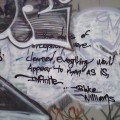FRIDAY SEPTEMBER 16
The news came down to the prisoners that after lunch they would be allowed to go outside. It had been a week since Zeitoun had seen the sun.
During the hour they were allowed in the yard, Zeitoun tried to jog, but felt light-headed. He walked around the yard, overhearing one bewildered story after another.
He met a man who said he had been moving furniture in his house just after the storm hit. The police spotted him and broke in. When he protested his innocence, they beat him up and left. A few days later, he
came to the Greyhound station to complain. They arrested him and sent him to Hunt.
No story was more absurd than the tale of Merlene Maten. One of the prisoners had just seen her story on TV. She had been held next door, at Hunt’s sister prison for women.
Maten was seventy-three years old, a diabetic, and a deaconess at the Resurrection Mission Baptist Church. Before the storm, she and her husband, who was eighty, had checked into a hotel downtown, knowing that there they would be among other residents and guests. They would have access to help if they needed it, and would be safer, given that the hotel was on high ground. They drove to the hotel in their car and paid for the room with their credit card.
They had been at the hotel for three days when Maten went downstairs to get some food from their car.
Mayor Nagin had told everyone in the city to have three days’ food on hand, and she had duly packed enough into the car to last. The car was parked in the lot next to the hotel, and Maten had left a cooler inside, full of the foods her husband liked. She retrieved a package of sausages and was walking back to the hotel when she heard yelling and footsteps. It was the police, and they accused her of looting a nearby store.
The nearby Check In Check Out deli had just been looted, and the police were looking for anyone who
might have benefited. They found Maten. She was handcuffed and charged with stealing $63.50 worth of
groceries. Her bail was set, by a judge calling by phone, at $50,000. The usual bail for such a misdemeanor would be $500.
She was brought to Camp Greyhound, where she slept on the concrete. Then she was brought to the Louisiana Correctional Institute for Women, Hunt’s sister prison, for more than two weeks. She was
finally freed with the help of the AARP, volunteer lawyers, a private attorney, and an article about her
plight published by the Associated Press.
The lawyers finally convinced a judge that a septuagenarian staying at a hotel would not need to loot a
store for sausages. They proved that the store did not even sell the sausages she was carrying. Maten had
never been in the store. Furthermore, to even enter the damaged store, strewn everywhere with debris and
broken glass, would have required an agility that she did not possess.
In the late afternoon Zeitoun heard a group of guards enter the cellblock. He couldn’t see them, but it
sounded like at least four or five men. A cell down the hall rattled open. The guards yelled and cursed,
and there was some kind of scuffle. Then quiet for a few minutes, and then the cell closed shut again. The
process repeated itself half a dozen times.
Then it was his turn. First he saw their faces, five men on the other side of the blue bars. He had seen
one of the guards before, but the other four were strangers. They were all wearing black riot gear, dressed like a SWAT team. They had shields, padding, batons, helmets. They waited at the ready for the door to open.
Zeitoun was determined not to struggle. He would not present any appearance of opposition. When the cell door slid open, he stood in the center of the floor, his hands in the air, his eyes level.
But still the men burst in as if he were in the process of committing a murder. Cursing at him, three men
used their shields to push him to the wall. As they pressed his face against the cinderblock, they
handcuffed his arms and shackled his legs.
They brought him into the hallway. Three guards held him while the other two ransacked the cell. They threw open the bedding, overturned the mattress, scoured the tiny room.
Two of the guards unlocked Zeitoun’s handcuffs and shackles.
“Take off your clothes,” one said.
He hesitated. He had not been given underwear when he arrived at Hunt, so if he took off his jumpsuit he would be naked.
“Now,” the guard said.
Zeitoun unzipped the jumpsuit and pulled it off his shoulders. It dropped to his waist, and he pushed it
to the floor. He was surrounded by three men fully dressed in black riot gear. He tried to cover himself.
“Bend over,” the guard said.
Again he hesitated.
“Do it.”
Zeitoun complied.
“Farther,” the guard said. “Grab ankles.”
Zeitoun could not tell who was inspecting him or how. He expected something to enter his rectum at any moment.
“Okay, get up,” the guard said.
They had spared him this one indignity.
Zeitoun stood. The guard used his foot to slide Zeitoun’s jumpsuit back into the cell, and then pushed
Zeitoun in, too. While Zeitoun was putting on his clothes, they backed away from him, shields up, and out
of the cell.
Zeitoun’s door closed, and the guards assembled themselves at the next cell, ready for the next prisoner.
From the other prisoners Zeitoun learned that these searches were common. The guards were looking for drugs, weapons, any contraband. He should expect such a procedure every week.






